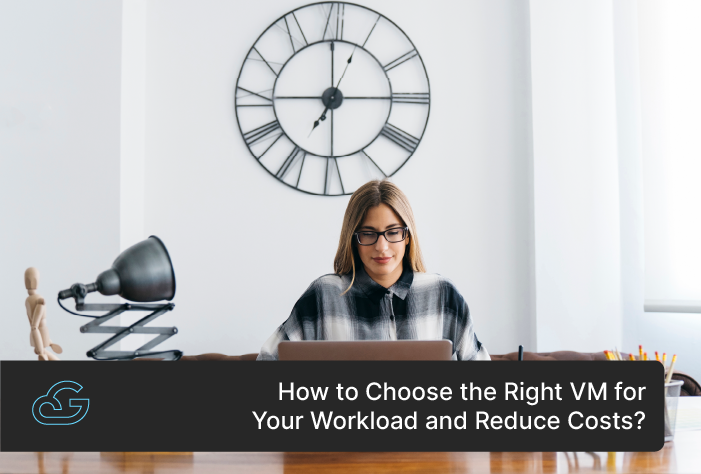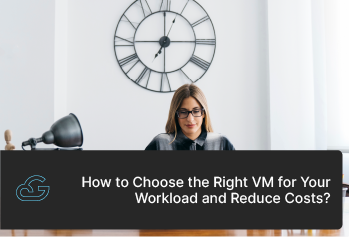Blogs / Virtual Machines
How to Choose the Right VM for Your Workload and Reduce Costs?
By
Harish K K
Posted: January 17, 2024
• 5 min 13 sec read
In today’s digital era, the demands on IT infrastructure have grown beyond traditional capacities. With more enterprises looking to build, deploy, and leverage software applications, the requirement for additional computing power, diverse testing environments, etc., has become absolutely vital to stay competitive. And Virtual Machines (VMs) have emerged as a crucial element to facilitate these expanding needs.
In this blog post, we uncover the crucial factors you should consider when choosing VMs for your workloads while briefly explaining their benefits. But before we get started, let us go over the basics and understand the concept of virtual machines.
What is a Virtual Machine (VM)?
According to IBM, a virtual machine serves as a virtual representation or emulation of a physical computer. Often referred to as a “guest”, they operate within a physical machine called a “host”. For instance, consider your main computer as the “host network”. Inside this host network, you can create virtual copies of complete computer systems, called virtual machines. Each virtual machine functions independently and has its own operating system.
What are the Benefits of Virtual Machines?
-
Flexible Testing Environment: Consider a scenario where you are testing a new software, but you are not sure how it will work in different operating systems. Here is how a VM can help you in this situation. A VM can provision multiple operating systems or testing environments, giving you the luxury to test your application on different configurations on a single hardware.
-
Server Consolidation: Server consolidation is one of the major benefits of virtual machines. By running multiple virtual servers on a single physical machine, VMs enable optimized hardware utilization, reduced costs and energy consumption, and enhanced overall performance. So, instead of investing in physical servers, you can seamlessly deploy new virtual servers based on your demands and requirements.
-
Streamlined Collaboration: VMs bring a set of conveniences to the table. Let's take the case of you working on a project and need to collaborate with others. VM eliminates the need for a dedicated physical machine for everyone. Instead, you can set up a VM for each of your peers on a single server, ensuring efficient collaboration without the complications of conflicting software versions or system configurations.
-
Enhanced Data Security and Disaster Recovery: VMs play a pivotal role when it comes to data security and disaster recovery. By functioning separately from other system components, VMs can easily create a robust defense against malware, viruses, etc. And, in the event of a disaster, compared to traditional physical servers with prolonged recovery times, VMs can be quickly cloned and deployed. This agility reduces the time taken for recovery, ensuring business continuity.
Who Uses Virtual Machines?
Virtual machines (VMs) are used by various individuals, organizations, and industries for a range of purposes. Here are some of the common uses of virtual machines:
- Software Developers: Developers often use virtual machines to create and test applications in different environments without affecting their primary development setup. VMs allow them to simulate various operating systems and configurations.
- Cloud Service Providers: Companies offering cloud services leverage virtualization to deliver Infrastructure as a Service (IaaS), allowing customers to create and manage VMs remotely.
- System Administrators: Sysadmins use virtual machines for tasks like server consolidation, resource optimization, and testing system configurations before deploying them to production environments.
- Educational Institutions: Virtual machines are used in educational settings for teaching purposes. Professors and students can experiment with different operating systems, network configurations, and software setups without the need for physical hardware.
- Data Centers and Enterprises: Large organizations and data centers use virtualization technology extensively for server consolidation, workload management, and resource optimization. VMs enable efficient utilization of hardware resources and simplify server provisioning and maintenance tasks.
How to Choose the Right VM for Your Workload?
While choosing the right VM for your workload, a multitude of factors can be overwhelming. Here are the four critical factors that you must consider before selecting a VM for your workload.
-
CPU and Memory Requirements
-
Disk Performance
-
Confidential Computing
-
Sole Tenancy
Choosing the right VM depends on its intended usage or workload. Start by evaluating the CPU and memory requirements relative to your workload characteristics. At the same time, you must pay close attention to resource optimization and identify what you do not require in terms of CPU and memory. Over-provisioning beyond the workload demands can often result in unwarranted expenses for underutilized resources. Therefore, striking the perfect balance will ensure that you can improve the performance while aligning the expenditure in line with the technical demands of the workload.
If your application needs the best disk input/output operations per second (IOPS), you'll want to ensure that you choose an instance type compatible with one of two high-performance options: local SSDs and extreme persistent disks.
Local SSDs have the advantage of being physically attached to the server that hosts your VM, which means you can get higher throughput and lower latency than standard persistent disks. They offer local block storage that is great for processing space, buffers, caches, and other temporary data. And for high-end, performance-critical applications, extreme persistent disks will offer higher maximum IOPS and throughput than other options. But, they will require at least 64 virtual CPUs.
A critical feature to consider while selecting a VM is confidential computing. Functioning as an added layer of security, it ensures encryption during processing, thereby keeping your data protected throughout the lifecycle. Confidential VMs are extremely important in scenarios involving sensitive client data, compliance adherence, and advanced security threat management.
Sole tenancy is another important feature to consider when selecting a VM for your workload. With this configuration, you will have exclusive access to a physical Compute Engine server dedicated solely to the VMs within your project. This is particularly vital in scenarios where certain application licensing requirements warrant dedicated hardware. And sole tenancy can offer a solution to this by providing an isolated environment. But before finalizing your choice, check the documentation for Compute Engine features to ensure that the selected VM offers sole tenancy option and matches the outlined criteria.
Summary
In selecting the right VM, prioritize key factors such as CPU and memory requirements, disk performance, sole tenancy, and confidential computing. These considerations not only optimize performance and operational efficiency but also contribute to significant cost savings.
Seize the opportunity to supercharge your business capabilities with Gsoft VMs and soar to new heights of success! Get started today and watch your business reach new horizons with Gsoft virtual machine services.


Get Know More About Our Services and Products
Reach to us if you have any queries on any of our products or Services.











